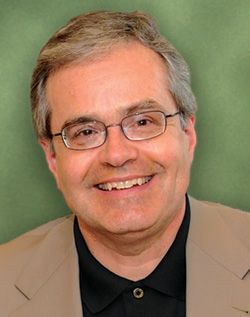Another Look by David Faust
There’s no reason to deny it, hide it, or cover it up. I’m guilty as charged.
I believe in God.
Not just any God, though. I believe in the Creator described in Genesis 1:1 and John 1:1—the God who designed a universe larger than our textbooks can describe or our minds can conceive. “By faith we understand that the universe was formed at God’s command, so that what is seen was not made out of what was visible” (Hebrews 11:3). I can’t fully explain that concept, but I find it far more reasonable than trying to explain how something came from nothing, life came from non-life, complexity from disorder, and personality from non-personality.
I believe in the personal, eternal God characterized by love, justice, wrath, patience, holiness, and grace—the one theologians call omniscient, omnipotent, and omnipresent, who also allows us to call him “Abba, Father.” I believe in “the blessed and holy Ruler, the King of kings and Lord of lords, who alone is immortal and who lives in unapproachable light” (1 Timothy 6:15, 16).
Yet, who am I to speak for God? He didn’t go on vacation and leave me in charge. On my own merits I’m not righteous enough or smart enough that you should listen to me.
I admit it: I’m a sinner. And not merely in some stained-glass religious way. When it comes to sin I’m the real deal—shallow, soul-broken, deserving death and Hell. And so are you. Without Christ we’re all in the same boat, and it’s sinking. Everyone sins, but the worst sinner I know intimately is the one who faces me in the mirror every day. After years of following Christ, in clear-thinking moments I’m startled he considers me his friend, amazed by his willingness to forgive and forget and forge on. The apostle Paul said it well: “Christ Jesus came into the world to save sinners—of whom I am the worst” (1 Timothy 1:15).
I admit it: I need Jesus. I need him more than air to breathe and water to drink. I needed him when I was young and I’ll need him when I’m old. I need him when I’m sick and when I’m strong, when everything’s going my way and when nothing’s going right. I needed him when I was buried in the waters of baptism, and I’ll need him when they bury my body in the ground.
I find no fault in Jesus. His words challenge me. His miracles fascinate me. His wisdom humbles me. His crucifixion moves me. His resurrection empowers me. His name emboldens me. His Spirit comforts me. His mission motivates me.
Not that it’s easy to follow him. Too often I’m like Peter, tempted to deny him when an unbelieving crowd turns up the heat, stammering under the interrogation of postmodern skeptics who embrace “spirituality” but dodge the truth-claims of Jesus. It’s easy to acknowledge the Lord at church surrounded by other believers, but what about in the workplace or the classroom where standing up for Jesus might look foolish or narrow-minded?
It’s just that those truth-claims won’t go away. I can’t deny the Master’s own words about marriage and morals, Heaven and Hell, money and greed, justice and mercy. Jesus can’t be reduced to labels like liberal or conservative, edgy revolutionary or old-fashioned status quo-keeper. He is who he is, and he said, “Trust in God; trust also in me . . . . No one comes to the Father except through me . . . . Anyone who has seen me has seen the Father” (John 14:1, 6, 9). We should take him at his word.
I admit it: even with all of its shortcomings, I still love the church. Jesus established it, died for it, and leads it. The world desperately needs a church devoted to the apostles’ teaching, fellowship, breaking of bread and prayer (Acts 2:42) where believers are “one in heart and mind” and share their possessions with those in need while giving bold and gracious testimony to the resurrection of Christ (Acts 4:32, 33). The principles and practices described in the New Testament remain relevant, practical, and appealing in every culture.
I admit that my own understanding of God’s Word is imperfect and growing, but this I believe: “All Scripture is God-breathed and is useful for teaching, rebuking, correcting and training in righteousness” (2 Timothy 3:16). I believe we should speak where the Scriptures speak and be silent where the Scriptures are silent. I believe we are “not the only Christians,” but we should be “Christians only.” The motto, “In essentials, unity; in opinions, liberty; and in all things, love” challenges me to stand firm on the bedrock truths of the faith while respecting others who love the Lord even when their views differ from my own.
A confused world needs a clear gospel. Let’s be clear and unashamed as we confess what we believe.




Comments: no replies